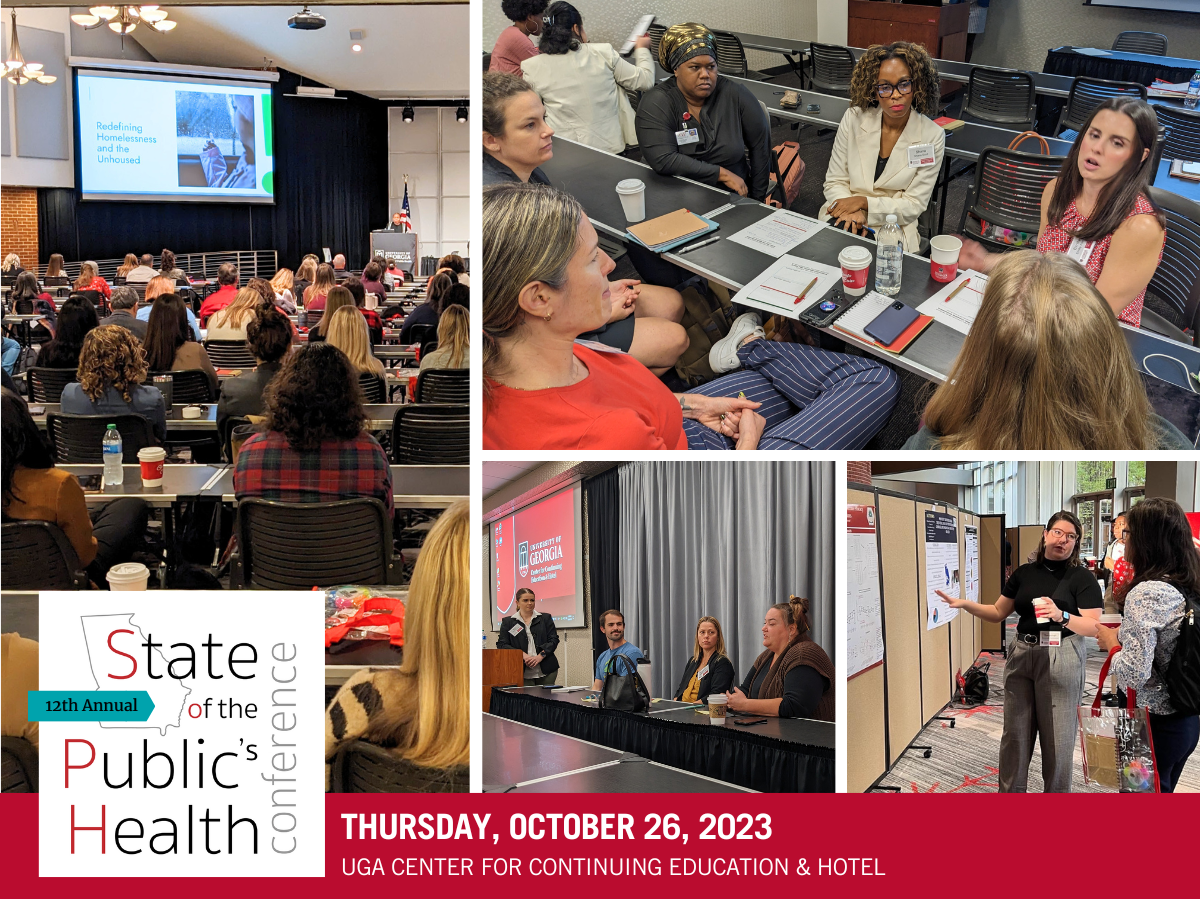Hundreds of public health professionals from across Georgia convened Thursday in Athens at the 12th annual State of the Public’s Health Conference (SOPH), organized by the University of Georgia’s College of Public Health.
The conference explores approaches to tackling the most pressing public health issues affecting Georgia communities today, including mental health care access, improving maternal and child health, and topics on health equity.
At the keynote address Thursday morning, Abby Charles, MPH, made the case to the audience to consider the current affordable housing crisis in the U.S. as a public health issue as well.
Charles, program director for the Institute for Public Health Innovation, joined the organization after serving for five years at the Women’s Collective, a nationally recognized organization providing care, prevention, and advocacy services for women, girls and their families living with and at risk for HIV in the Metropolitan DC area. That work exposed her to the connection between health and housing.
“It is critical for the public health community to see housing as a public health issue and a healthcare issue,” she said. “If you don’t have housing, your health is almost nonexistent.”
Charles asked the audience, made up of state and federal public health professionals, academics, community-based organizations and nonprofit institutions, to think about how their own homes provide safety, security and stability.
“If you lacked that security and that safety, you’re constantly operating in this space of deficit,” she said. “(Being unhoused) constantly affects your physical health, it’s constantly affecting your mental health. You’re in this cycle of need.”
No state in the U.S. has an adequate supply of housing for the people who need it, Charles said. While the affordable housing crisis is felt hardest by people living in poverty, there are thousands of American workers who are making above poverty wages but are still unable to afford housing.
Further complicating the scope of the crisis, many unhoused people are living in vehicles or on the street and cannot be accurately counted, Charles said. Millions more are at risk of falling into a housing crisis and the health issues that follow.
“Public health has the lens that no one else has as it relates to epidemiology of disease and how we use data to solve issues,” Charles said. “How do we get to these solutions? First, we have to admit that housing is a public health issue. And we need to get public health leaders to be a part of the solutions to address housing.”
“The only way we’re going to be able to address all of this is through collaboration.”
Collaboration was stressed by UGA College of Public Health Dean Marsha Davis as she welcomed the diverse crowd to the conference. While their home communities and focus areas vary, attendees came together to help solve some of the biggest healthcare challenges facing Georgia and beyond.
“We draw strength and clarity from our unwavering commitment to champion the health of all,” Davis said. “We conduct research, we educate, we implement and evaluate programs, we shape policy.
“But beneath all of this action is a fundamental principle: the quest for understanding.”
In addition to the wealth of speakers and sessions, public health officials put the latest projects from their organizations on display boards in the atrium of the UGA Center for Continuing Education & Hotel.
The sharing of these different initiatives, findings and programs among those passionate about improving the public’s health is a key component of SOPH, designed to drive meaningful, solutions-oriented discussion to advance the health of all Georgians.
“We have sought in this conference to bring together professionals from across the state and across sectors to drive meaningful conversations and share ideas that we can take back to our organizations and our communities to improve health and wellbeing for the public health of all,” Davis said. “How do we move forward? We move forward together.”
In the afternoon keynote session, K. Chad Clay, Ph.D., discussed the measurement of human rights practices and how the U.S. stacks up against other high-income democratic countries. In the Right to Health category, the U.S. ranks last among its peers.
“(The U.S. is) the only large, high-income democracy that has not ratified the international covenant on economic, social and cultural rights,” Clay said. “The right to health is not a legally binding human right in the U.S.”
Clay is the director of the Center for the Study of Global Issues (GLOBIS) and an associate professor in the Department of International Affairs within the School of Public and International Affairs (SPIA) at UGA. He is also the co-founder of the Human Rights Measurement Initiative (HRMI), a collaborative venture between human rights practitioners, researchers, academics and other human rights supporters that aims to produce the first comprehensive set of measurements for tracking the human rights performance of countries.
“I think, I hope human rights-based approaches to advocacy and measurement can be helpful in improving human rights outcomes in the United States,” Clay said.
The College of Public Health will continue to grow the SOPH conference as a forum for nurturing statewide efforts to transform the health of all communities. To learn more about SOPH and view webinars and previous UGA Public Health Engage Seminars, visit soph.uga.edu.
– Joe VanHoose
Scroll through our Facebook photo album of the 2023 SOPH conference or read through our collection of conference briefs provided through reporting from UGA Grady College of Journalism & Mass Communication news room.
Posted November 2, 2023.







